Next week I’ll be travelling on Eurostar for the first time since the start of the pandemic. I like my trains, but I loved Eurostar. It was an icon, a symbol of something I’d dreamed about as a kid, but hardly dared imagine it would come true. This is the story of our broken love affair, and like most such stories, it is a bit long, overwrought, and lashes out at third parties. Despite that, I hope you may enjoy it.
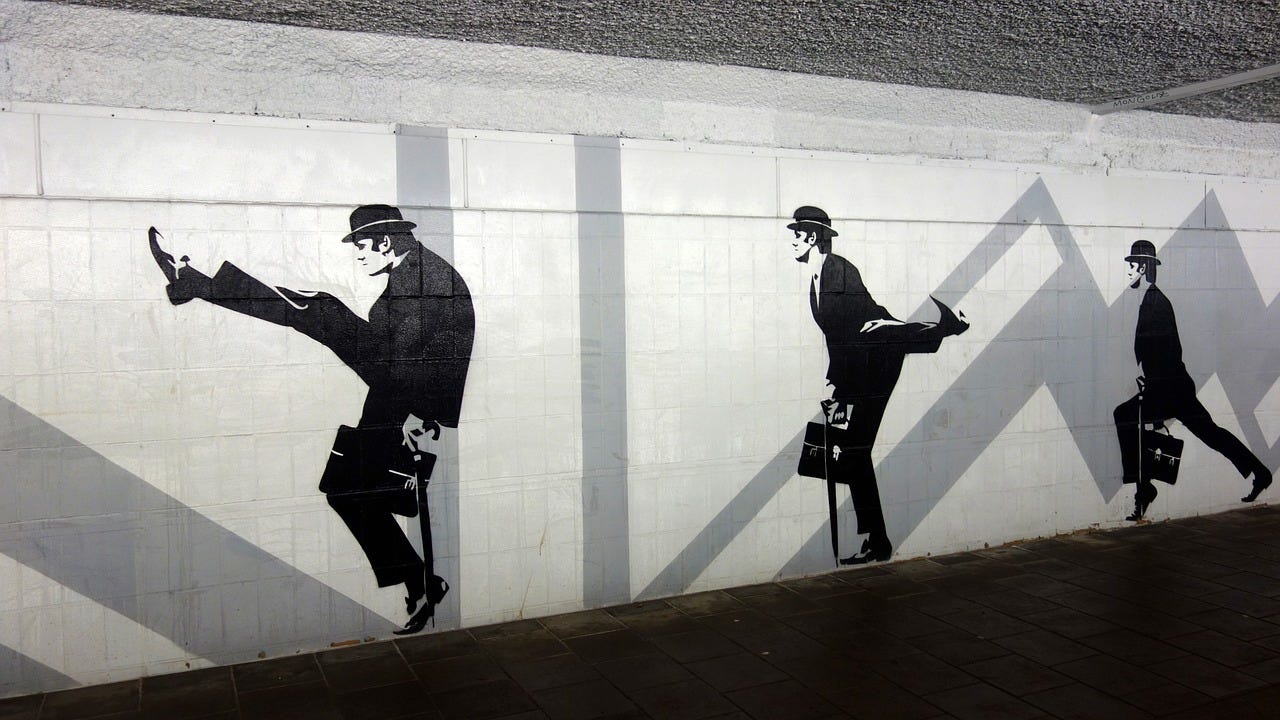
The British are an island people. If you ever find British behaviour eccentric or even infuriating, or wonder how we create enjoyable cultural icons like Monty Python or our endless stream of modern musical talent, I would recommend you to keep the “island mentality” in mind.
This mentality is less strong among younger people – they did not vote for Brexit – but when I grew up you could not help but be influenced by it. And I was one of the more outward looking kids; at school I was learning French and German, and it had not escaped my notice that the Dutch were supporting the pirate radio stations that I listened to because the BBC was not permitted to play much modern music; and then I had watched open-mouthed as Ajax Amsterdam and Johann Cruyff showed us what the next generation of elite football could look like. It dawned on me that just across the sea there were some very cool people.
“Just across the sea”… the distance between Dover and Calais is 42 km. On a clear day, I was told, you can easily see France. In practice, over a lifetime of journeys on that route I could see my destination on departure on probably 20% of cases. That's not to say that all the crossings were rough - but the crossing always seemed like a big deal, loaded with historic symbolism. And until I was around 30, taking the plane to get from London to Amsterdam or Paris was something that only business people did.
But the lure of the lands across the Channel was strong.. When I was 18, I met a Dutch girl named Bea at my local swimming pool; she was visiting relatives; she was exotic and fascinating. The next summer, with some money coming in from the company which sponsored my University study, I arranged to go and see her in Apeldoorn. This involved a ferry across the Channel. I paid for it and the rail tickets in advance, and then on the afternoon before I was due to leave, I learnt from the radio that due to bad weather in the Channel all ferry services were cancelled. I learnt this while sitting in an office just 100 km away from the coast, and outside the sun was shining and I don't recall that the wind was anything exceptional either. I had to inform her of all this by means of a telegram. And as for my tickets – I'm not at all sure I had anything like insurance to cover my loss.
In the early 80s a new and much faster way to get across the Channel emerged with the launch of Hoverspeed. It used big hovercraft (a great British invention that we never made the most of) which could carry cars as well as a large number of passengers and it was at least twice as fast as a typical ferry. I thought this looked pretty cool and I used it to make a day trip to Calais. But I was lucky to even make it back. A hovercraft could not handle rough seas at all, and on the way back the wind was starting to exceed Force Four, which was the maximum they could operate in. It wasn’t particularly rough, but it wasn’t exactly romantic, and their sensitivity to the Channel weather ensured they were not a reliable solution.
So it was back to the ferries when a friend and I took the car to visit friends in Düsseldorf and Amsterdam in 1989. The outward journey was one of the worst I experienced we sat outside in the drizzle because this was supposed to be the best place to avoid seasickness, but also because if we had stayed inside in the restaurant area we might experience somebody's lunch plate smacking us in the face after it flew through the air. On the way back, the Channel was OK but we were tired after a long drive back from Amsterdam, and the last thing we wanted was a long and unexplained queue after disembarking from the ship to get through the border controls. When the wait time reached 40 minutes my exasperated buddy decided to berate the guy who (to be fair) simply had the task of keeping the queue of cars in line. “Oi! We’ve crossed six borders in the last five days and nobody stopped us. Why do we have to wait like this to get back into our own country?” I remember the reply like it was yesterday, delivered with equal aggression: “Why? Because we’re an island! That’s why!”
We were both speechless, which was unusual for us. Deflated, we finally got away and onto the M2, getting used once again to driving on the left. But I consoled myself with the thought that somewhere nearby in the darkness there was work going on, big work, which would make things a whole lot better. Boring machines were already working both here and at Calais, heading towards each other. They were building the Channel Tunnel.
The Big Dream becomes real
I could never quite believe that it was happening, especially as it had started under the reign of Margaret Thatcher's Conservative government. She was no friend of the railways, and apparently she did assume initially that it would be a road tunnel. However a detailed study had been commissioned which determined that the rail solution (with a shuttle service carrying vehicles) would be best overall. To be fair Thatcher was always in favour of the Single Market and anything which improved trade between Britain and the Continent made sense to her. The French were even more enthusiastic about it, and despite their different politics, Thatcher and President Francois Mitterrand seemed to get on well at a personal level. The tunnel was to be privately financed, the company was named Eurotunnel, and it had a 65 year concession from the two governments to build and operate it, together with an operational agreement with the two nations' state-owned rail companies. It seemed like a triumph of international cooperation despite the project inevitably experiencing big overspend compared to the original budget. It finally opened in 1994, by which time Europe had changed even more spectacularly, and I lived in Prague. This meant that I had to watch from afar as the sleek and huge new Eurostar trains started their services to Paris and Brussels.
My first few journeys through the tunnel were on the car shuttle, to bring more and more of my personal items from London as it seemed Prague was really going to be my permanent home. I can't remember exactly when my first trip on Eurostar was, but it was from Paris to London and I remember my mixed emotions about the trip. The train itself was as wonderful inside as it looked outside, and I looked out of the window in awe as we slipped out of Paris Nord alongside so many equally impressive looking TGVs and accelerated onto the new high-speed line. Soon we were running alongside an autoroute, and I gawped as we overtook every vehicle on that road with effortless and contemptuous ease. We slowed to enter the tunnel, and then the Eurostar picked up speed again; it was a bit unnerving being in such a long tunnel but I reminded myself that I had spent an equal amount of time every day in the London Tube tunnels on my old commute. After 25 minutes we emerged into the sunlight and England! And then we slowed down. And then the ride became less smooth. And then came the familiar old sound, clackety-clack, clackety clack. For reasons which now seem shrouded in the fog of the past, the French had made sure to build a new high-speed line to the tunnel in time for its opening, yet we Brits had not even decided on the route for our new high speed line. We were running on the old line shared with regular commuter trains to London. It was embarrassing to experience the consequences for the journey which then needed 3.5 hours for the run from Paris to London. But this was the time of wider confusion on Britain's railways due to the chaotic and eventually fatal privatisation implemented by the Conservative government of John Major. I had to conclude that while it was great that Eurostar existed I had little reason to use it, because I rarely found myself in Paris. Whenever I visited London, I travelled by air.
Finally in 2007, the British finished the new line which diverted Eurostar away from Waterloo station to the elegantly re-designed St. Pancras. At first I grumbled to my sister about this; Waterloo was convenient both for visiting my family in Eltham to the east where we were born and raised, and Surbiton to the south-west where I still had my house and a gang of good friends. St Pancras was to the north and far less easy to get to. “Yes”, replied my sister “but they are building a new station at Ebbsfleet. It will be an easy 15 minute drive in the car down the A2”. Slowly the implications of this dawned on me. I consulted the Eurostar website :
Ebbsfleet - Paris: 2hrs 5mins
Ebbsfleet - Brussels: 1hr 50 mins
Ebbsfleet - Lille: 1hr 9 mins
Was I dreaming? Or rather, had my dreams come true? I calculated: 20 minutes to arrive and get parked at Ebbsfleet International, allow 30 minutes before departure (in a very relaxed procedure which gave us time for a coffee) …that literally meant that we could be in a fine French city two hours after we locked the front door of the house. No plane journey could match that.
As Christmas approached in 2008, my sister was recovering well from a cancer operation (thank you always, NHS) and my Mum, while still able to get around, did not do so enough. So I announced that between Christmas and New Year I would be with them to celebrate my sister’s recovery with a nice lunch in a French restaurant…in Lille.
And that is exactly what we did
.It worked perfectly; the journey to Ebbsfleet was as easy as my sister suggested it would be; Ebbsfleet station was perfectly organised so it was no problem for my Mum; the restaurant I had chosen and reserved in Lille simply using online resources was perfect, and afterwards we discovered that Lille had an excellent Christmas market. It was freezing cold that day and we had to spend the last hour in a shopping centre just to keep warm, but overall Lille was a rewarding place to visit. And Eurostar? They loved it too. My mum had been distinctly nervous about the tunnel itself, but the comfort and smoothness of the train seemed to reassure her and it wasn't difficult to keep the conversation going through the tunnel to stop her from brooding on it. 69 minutes from a French city to familiar Ebbsfleet! I still could not quite believe it.
The following year we repeated the idea, this time going to Brussels, and again everything worked as planned, although the journey was longer, and my mum a year older. The one problem was caused by another example of the ridiculous British attitude towards its borders. Britain had insisted that border controls on the continental side had to take place before boarding the Eurostar trains. So there in the middle of Brussels Midi station was the passport control, and above it a huge sign, arrogantly proclaiming “UK Border”. If only the rest of it had been as big as the sign; there were not enough booths to handle the passengers, and they were staffed by people with a serious attitude problem (something which had been more noticeable within the UK Border Force since that initial confrontation at Dover in 1989, and which my buddy who worked as a senior immigration officer had confirmed as a systemic recruiting and training issue). It was taking ages, and Eurostar, a huge train, takes time to board as people need to find their seat in the correct one of 18 coaches. In front of us a young German student reached the booth. I know she was a young German student because I could hear all her answers in fluent English to a series of unnecessary questions, such as ‘where are you from?”, which is an odd question to ask when you have her German passport in your hand. And in case you were wondering, she looked like a typical German student. There was absolutely no need to interrogate her about the purpose and logistics of her visit. We were in the European Union and she had every right to visit. With great difficulty I resisted the temptation to remind the border guard of this, but when it came to my turn I put on my best scowl. We finally got through literally five minutes before Eurostar was scheduled to depart, and we were far from the last. I did not realise at the time that I was witnessing one of the main reasons why Eurostar was unable to successfully expand beyond its core routes. There has never been a really convincing case made why border checks cannot be made on the trains while they are travelling, as for example we sometimes see on international trains between Czechia and Germany; or why luggage screening is considered necessary for the Channel Tunnel when it is not considered necessary for the Gotthard Base tunnel or the Öresund bridge.
The Happy Train
Despite that, I was now well and truly in love with Eurostar. It was never cheap, but before the pandemic, if you booked in time you could get a decent price. The staff were generally very good, the trains were comfortable and punctuality was excellent whenever I used it. I thought of Eurostar as the happy train; there was a very positive vibe from the British people discovering they could go on a trip to Europe just by jumping on a train. Of course the happiest train of all was the one that ran direct to Paris Disneyland. And Ebbsfleet station was absolutely wonderful, you would just stroll into a gleaming modern station building, scan your ticket, put your luggage through the machine (no undressing required) and flash your passport at first a UK and then a French border guard; and then you could stroll into the departure lounge above the platforms, where you waited until they called you to the platform, and you could find exactly the right place on the platform where your coach would be once the Eurostar from St Pancras came to a halt. Well it really was that easy, once I had got the UK border guard fired. Sorry, you did what? OK, there probably isn’t that direct causal link but I really have to share this final example of UK Border Force inanity - and my revenge.
At Ebbsfleet both the British and French border force are present to control people leaving the UK only; those entering the UK are controlled before they board on the Continental side. Usually therefore both guards were happy just to have a quick look at your passport. The exception came one day when I had already started using the train to get all the way back to Prague. The UK guard had the air of a particularly annoying type of football referee – the type who thinks the crowd have come to watch him rather than the footballers. He spoke very loudly. With my passport and ticket in his hand, he commenced his important interrogation:
“Good afternoon, Mr Hunt, where are you travelling to today? “
“Brussels” ( I managed not to add “as it says on the ticket you are holding”)
“I see- and what are you going there for?”
“ Actually I am taking a train onwards from there”
“Really, and where to?”
“Prague”
“Prague?? And what are you going there for?”
“I live there. It’s my home now”
“Really?? and what do you do there? Are you retired or something?” (this pissed me off as I really didn’t think I looked like a “pensioner”, especially on that day when I was quite formally dressed).
"No I run my own business”
“Really? What kind of business?” (I resisted the urge to answer “arms dealing”)
"Consultancy"
“ Really?? and what kind of consultancy?”
“Human resources” - this fairly vague answer finally stopped him; or maybe he noticed the growing queue behind me, some of whom were smiling and others clearly just as pissed off as I was because we had a train to catch.
“Well, have a good journey”
I suppose Bill Bryson would have answered “Thank you. Die soon” but I just gave him a look and headed for the lounge and a very quick espresso, which only fuelled my desire for retribution. I discovered with some difficulty a webpage where I could complain about the behaviour of Border Force staff and did exactly that. I pointed out that I was a British citizen looking to leave rather than enter the country and looking and behaving respectably. I pointed out that he had no good reason to ask me such personal questions and whatever my answers there were no grounds to deny me the right to leave my own country and board a train. Eventually I got a reply which of course did not address my exact complaint and simply implied that the guard was just doing his job. However when I next took the train from Ebbsfleet a few months later he was not there. That in itself was not surprising since I had never seen him before. But his booth had gone too. Instead I was greeted at the entrance by a polite and smiling border guard who held a scanner to my passport. It clearly told him everything about me that he needed to know, and he wished me a good journey. I almost kissed him. It was probably a coincidence that they decided to switch to scanners – but I will always claim this as my revenge.
But the Border Force was and is completely beyond Eurostar’s control and the love affair was in full swing. When visiting London from Prague I usually chose to fly in, and return by train. Doing it that way round maximised the benefit of the very relaxed transit to and check-in at Ebbsfleet compared to the often stressful trek across London to tumultuous Heathrow. I was able to choose this because the pace of my working life in Prague was nicely slowing down and I was very much in charge of my own time. It did cost me - as Eurostar became more successful, so the prices edged upwards, and the sleeping car back to Prague was never cheap. But it was fun! I never tired of looking out of the window as Eurostar raced towards the tunnel through the familiar Kentish countryside - I reminded myself of the old days, and happily concluded that finally I lived to see the day when the Trans-Europe Express reached London. Eurostar tried to expand with several new services; the ski-train direct to Bourg- St Maurice in winter, and to Marseille in summer. I was envious. There was much talk of a new service to Bordeaux, which prompted my sister and I to discuss the possibility of buying a little house in that area which we could share the use of. It became possible to buy a ticket from Eurostar which was valid for a connecting train to many European cities - I saved money a few times to get to Cologne for my sleeper train to Prague. And while they did not advertise this, you could buy a few tickets for the Paris Metro in the bar car, which was very handy when it became necessary to get to Gare de Lyon for a TGV to Zürich. And Eurostar always reminded customers that every time we chose Eurostar over the plane we saved quantifiable amounts of environmental pollution. It was a great product, and a great brand.
And then came Brexit.
I took a Eurostar from Ebbsfleet a couple of weeks after the referendum happened. As the train arrived I was very surprised when the guy waiting with me struck up a conversation by referring in blunt terms to the Brexit decision. I was surprised because British people don’t start conversations that way, unless they are in a pub and very drunk. His view of Brexit was exactly like mine, fortunately, but it struck me afterwards that he could not have known that, when he opened the conversation. A new insight dawned on me. Eurostar was the happy train. Now it was almost certainly the Remainer train. And we had lost. My beloved Eurostar suddenly looked very vulnerable.
I didn't tell you all those stories about the Border Force just to get them off my chest. The UK’s attitude to its borders is one of the main factors that has held back Eurostar’s expansion across Europe. If Eurostar wanted to start new services from any station in Europe, that station would need to provide dedicated space for passport and baggage control, and hang above it the big sign declaring “UK Border”. That was the main reason why Eurostar could not start running to Cologne and Frankfurt which were obvious, lucrative destinations. Their stations are busy and already cramped. There was no way they were going to accede to this demand from Britain, even before Brexit. Think about it. Imagine that Eurostar ran from Manchester to Frankfurt and that Germany insisted on similar passport controls in Piccadilly station with a big “German Border” sign. What do you think might happen to that sign after Germany once again beat England on penalties in the football? It was exactly this issue that delayed so long Eurostar’s launch to Amsterdam. You may also wonder whether such a building was erected in Marseille St Charles station when Eurostar arrived there. No. The French were not having any of that nonsense. Instead on the return trip from Marseille to London, passengers had to get off the Eurostar at Lille, with their bags and go through passport and security control there, and then get back on the train which left at least 45 minutes later for London. Can you imagine having to do that at Bad Schandau, on the way to Berlin? It's like something out of Monty Python, but it's absolutely real and not very funny. And you won't be surprised to learn that Eurostar no longer runs to Marseille.
Eurostar relies for its success on a spirit of cooperation across the European countries that it seeks to connect. The political attitudes which produced Brexit were hostile to Eurostar. Even before the referendum, the then coalition government started the process of stepping back from such cooperation by announcing its wish to sell the 40% stake in Eurostar owned by LCR, the company formed to represent British interest alongside the French and Belgian interests. This had devastating consequences for Eurostar when the next Black Swan came over the horizon.
The Pandemic.
It was inevitable of course that when the pandemic took hold, Eurostar would not be able to operate. Neither of course could any of the other rail operations, but the government agreed to generously subsidise them all through the worst period, as well as British Airways even though BA was now owned by a Spanish company. All, that is, except Eurostar. The British government was basically saying “Eurostar is French, it is a French problem to solve”. Eurostar responded by becoming more French, or rather more SNCF. Early in the pandemic it closed my Ebbsfleet station as well as the other station in Kent at Ashford. But in 2022, once Eurostar had managed to restart operations, its CEO, Frenchman Jacques Damas announced that its strategy from now on would be to concentrate on “core routes”, meaning that Ebbsfleet and Ashford would remain closed and the British could forget about Eurostar taking them to nice places like Avignon or the French Alps. It’s worth reading this report of his statement to the UK Parliament. And while as a British citizen I did want someone to ask Mr Damas all those questions on my behalf, it was ironic that some of the people asking those questions were the very ones who promoted Brexit and had made Eurostar a “foreign” operation. So they could ask all the questions they liked, but they had absolutely no leverage with which to persuade Mr Damas to do anything different. Indeed things got worse; it was announced that Eurostar and Thalys would merge. Thalys is widely criticised for its arrogant attitude towards customers and the fear now is that the main interest of the group will be on services between the big Northern European cities, and the line to London will be treated as just some kind of branch line. That is probably an exaggeration, but in the last year Eurostar prices have gone through the roof, partly because they still run with less capacity than before the pandemic. It is now a choice only for very well off people, especially those who are not personally paying for the ticket anyway.
“It’s over- the light don’t shine no more…”1
The love affair is almost certainly over; there are now demands in Britain for “competition” to Eurostar to teach them the lessons of the market. That seems reasonable, but the market is rigged. There is plenty of space on HS1 (the high speed line from the Tunnel to London); one reason for that is that the track access charges are said to be extremely high. This in turn is because HS1 is an entirely privatised line. The British government wanted it that way and it has been sold from one International consortium to another, again we have no way to influence their decisions. The rest of Britain's track infrastructure is back under State control after the disaster of Railtrack in the 1990s, but Network Rail, the national infrastructure manager, is simply a subcontractor for HS1, and it does not appear that any other regulatory body can hold HS1 to account either. As for the tunnel itself, it is run by Getlink, a “European” company with a Paris HQ. It also wants to see more traffic running through its tunnel, but it is the company that makes the safety rules that govern what kind of trains can be certified to run through the tunnel. In the past this has been a controversial issue, not informed by many clear facts. But the biggest barrier remains the UK border. Any new train company wishing to operate from Europe to London will face the same problems as Eurostar. Want to run from Frankfurt and Cologne? OK, good luck with persuading Deutsche Bahn to build that UK border in those two stations!
Independent rail commentator, Jon Worth knows more about this subject than I will ever learn, and fortunately he recently posted this excellent analysis of the current situation and future prospects for international passenger train services through the Tunnel. Underlying the specific situation of this line is the perennial Big Question: Railways, public or private? The British public, so fed up with the state of their railways, now favours re-nationalisation when asked in opinion polls. But Jon is brave enough to say “I’m not sure” and I am with him on this. Railways are a strategic national asset - in Europe they become an asset of the entire continent. They are too important to be left to the whims of the market. Yet I spent 40 years in the real private sector. All my work, every day was informed and motivated by competition. I can readily see that Radim Jančura’s Regiojet pushed České dráhy to fight harder for customers and become a better operation. Yet we also see the downside: Jančura’s introduction of night trains to the Croatian coast was hugely popular; but he has decided to stop them so that the train can instead be used to run into Western Ukraine. He argues, not unreasonably, that he can make more money because it will be a year-round service. But he does not care that Czechs can no longer choose to go on holiday to Croatia by train. That’s not his problem.
In the pre-pandemic years Eurostar did not consider that it had a monopoly. It had competition. Airlines. That was one of the good reasons why the trains called at Ebbsfleet and Ashford; those stations served a catchment area of up to 2 million people who, if they were to fly to Paris or Brussels, would need to leave their homes at least three hours before their flight would take off from Gatwick, the nearest airport. Those people’s journeys to Gatwick would have to be by car, adding significantly to the total emissions for their flight.
The new owners of Eurostar seem completely uninterested in the above facts. They insist that they will not re-open Ebbsfleet or Ashford because they have to “concentrate on their core routes”. To be clear, Ebbsfleet and Ashford are on the core route. But as part of this new “focus”, they also make clear that there will be no more Disneyland trains (children are not “high yield” passengers) nor holiday trains to the Alps, nor competition with the TGV services to the Med. Why would they want to compete with the TGVs? The TGVs are SNCF, and Eurostar is now SNCF too. It is clear that Eurostar is now to be treated as a cash cow. The monopoly will be exploited to its maximum. The evidence is there to see in the price of the tickets for my journey home next week, which I booked in the middle of November last year. :
Eurostar, London-Paris, standard class: €101
TGV , Paris-Karlsruhe, first class: €49
Oh and today I got a mail from Eurostar offering me the chance to upgrade my journey to Standard Premier. How much extra would they ask for this? Another 20%? Another 50%?
The extra amount asked was €141, a total of 131% more, for a solo seat, if one is still available, and a light meal. “With more space and comfort, and so many other benefits, it’s hard to say no.”, the email shouted at me. Yeah, it was really hard. But, I said no. I’ll buy a nice seafood salad from M&S and work out what I’ll do with the €130 euros I’ve still saved.
I cannot love a company that behaves like this. It is not my Eurostar. It is being run by a new team who seem to me to behave like second-rate managers who would not last six months in companies involved in really competitive markets.
And yet, and yet….in 2021 there were news stories suggesting Eurostar might collapse, but yesterday they announced strong passenger figures for 2023. It is still alive. We will still leave the Mercs and Audis on the M2 in our wake as we race across Kent at 300km/h. And there will be a General Election this year. The Tories are going to lose heavily, and the nation will breathe a sigh of relief as it did in 1997. The Labour party is cautious, it does not want to commit even to re-joining the Single Market, let alone rejoin the EU. I understand that. The nation has no appetite to re-start the bitter debate that divided families, including mine. (My Mum voted Leave, broke my heart, and passed away soon after). But I am sure that Keir Starmer will be welcomed by Europe as an adult, someone who wants to get on well with his nearest neighbours. He and Macron will see the benefits of making the border run smoothly again, increasing trade and restoring neighbourly contact. He cannot easily regain some British state control over Eurostar or HS1, but if he fixes the border problems he might persuade GetLink, the Tunnel owner, to open discussions again with Deutsche Bahn.
People forget, or wonder if they just dreamt, that in 2010 a Deutsche Bahn ICE really did run through the tunnel to St Pancras. I still believe that I will live to see the day when I will travel from Prague to London with one quick change in Frankfurt, in about 9 hours. I guess that train will be red and white. And Eurostar, my old love? Well I daresay she will still be “concentrating on her core routes”. Fine. Good luck to her. She changed, not me. But yes, I will treasure the memories.
Southside Johnny and the Asbury Jukes, “Light don’t shine”

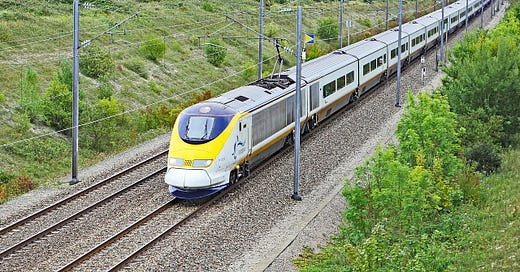



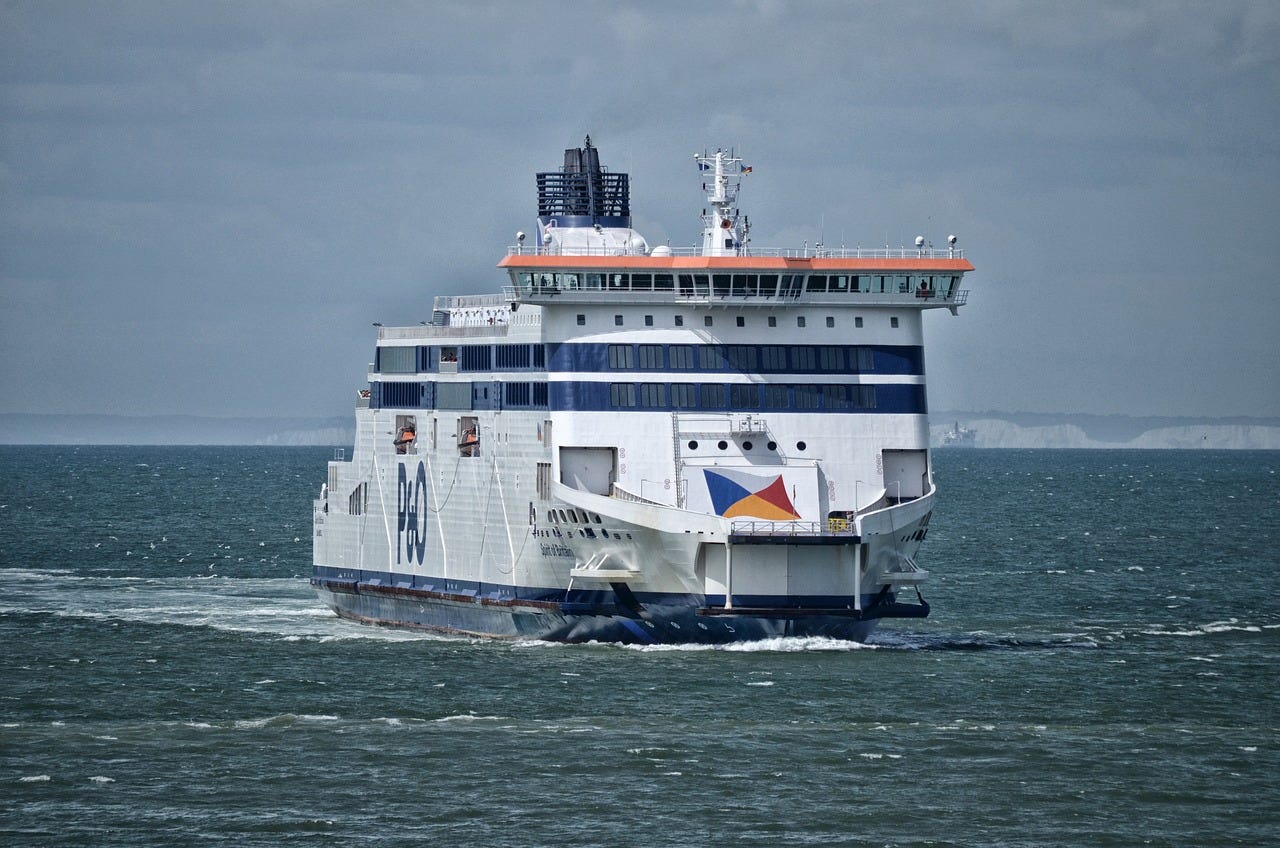

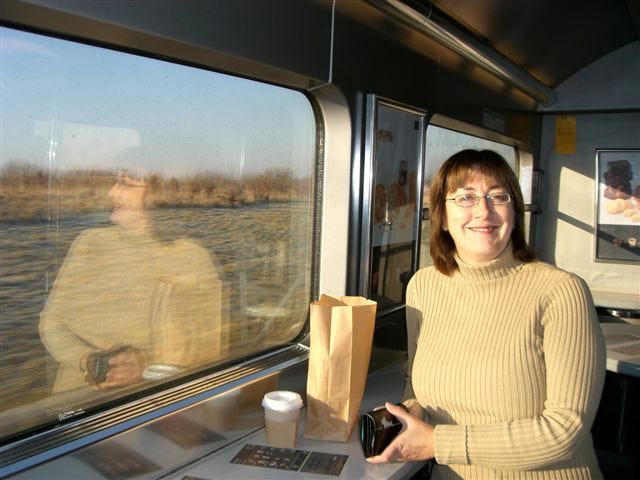
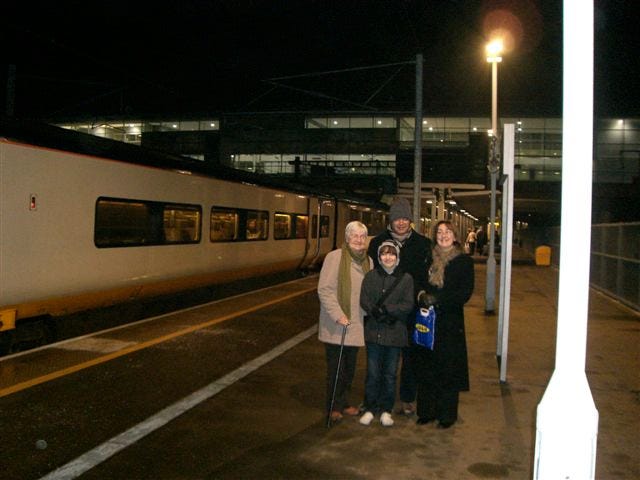
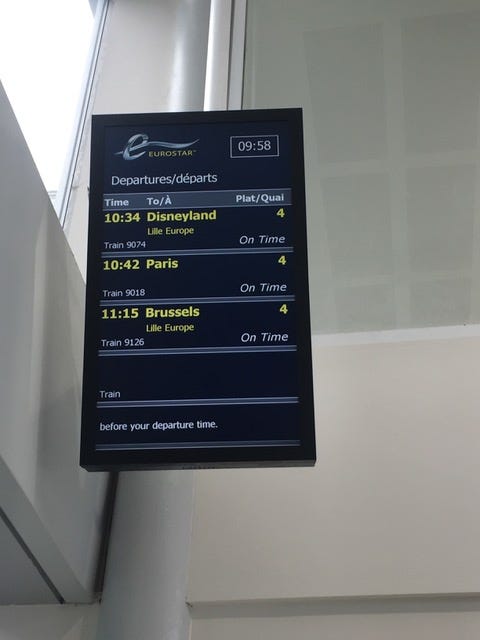
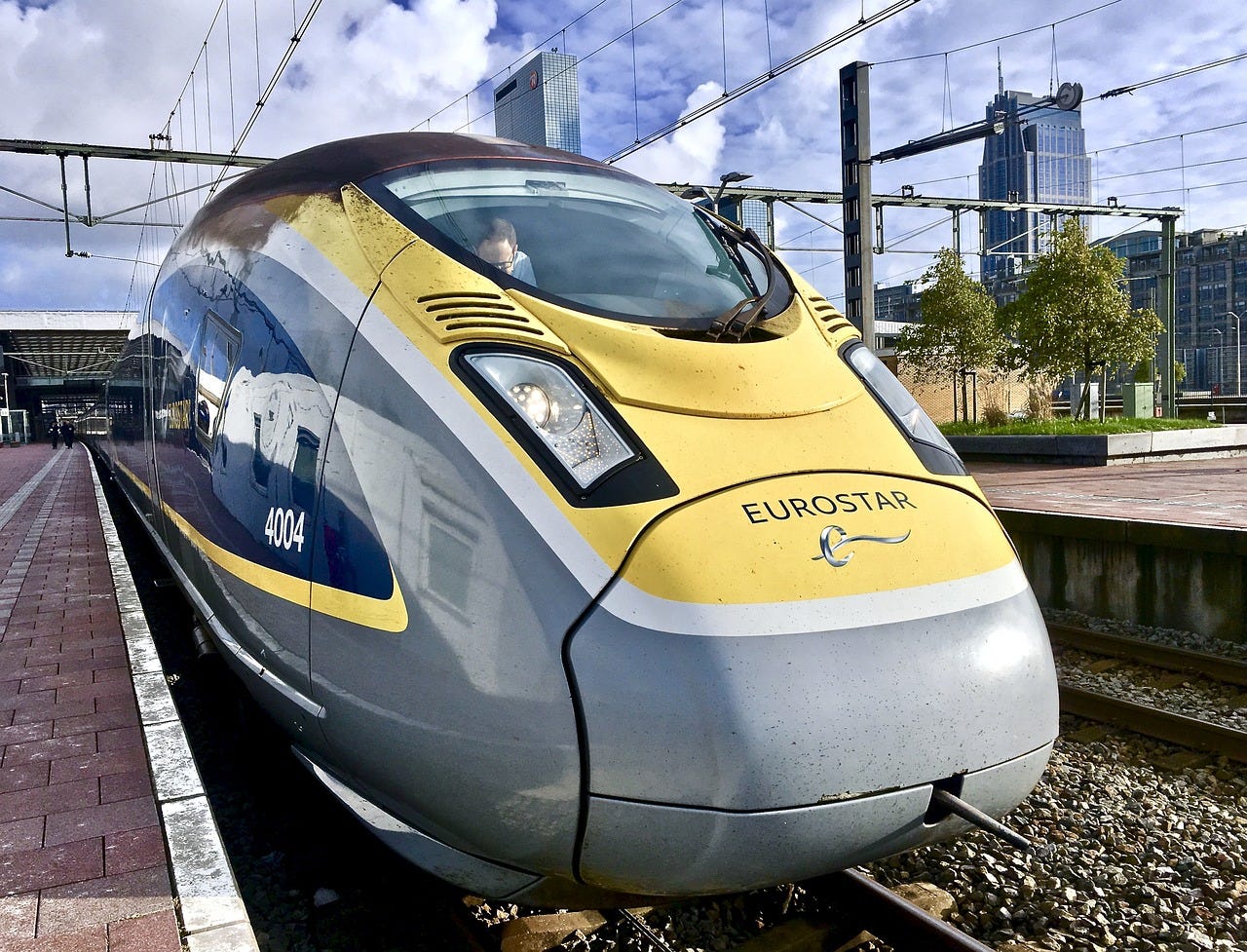
Richard you’re right to highlight the curse of UK Border Force requirements, which insist Eurostar travellers from places other than Paris and Brussels leave the train for security checks at Lille. Even in the days of train travel across the Iron Curtain when it existed, did you need to do that. The checks were rigorous and intimidating, but nobody had to get off the train.